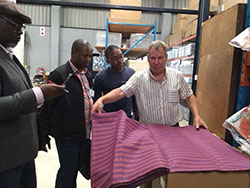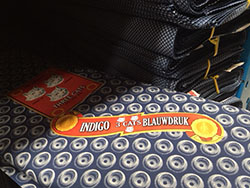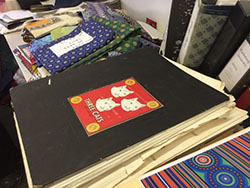The Roles of IP and Diversity in the Creative Industries
Project team and partners
Principal Investigator: Professor Charlotte Waelde - Coventry University
Research Assistant: Dr Kate Marsh - Coventry University
Co-Investigator: Professor Enyinna Nwauche- Fort Hare University
Project objectives
The overall aims of this network are to:
1) consider the extent to which the findings from UK and EU research projects investigating the role of intellectual property in the micro creative industries might be useful for informing South African policy and practice, and to consider ways in which the protection of indigenous knowledge and traditional knowledge in South Africa might impact on cultural industries' trade with the UK (and Europe), and how, if at all, that might inform policy-making in England;
2) investigate and compare the extent to which different regulatory frameworks on diversity and equality between South Africa and the UK impact on participation in the micro creative industries;
3) consider if, and how, the different cultural traditions as between South Africa and the UK in relation to intellectual property and diversity policy as they impact on the micro creative industries, might inform policy-making in the respective jurisdictions with a view to strengthening sustainable development.
The objective is to inform policy-making in both South Africa and the UK in relation to IP and diversity strategies for the micro creative industries and international trade. It is also to create strong and lasting conversations among academic researchers, creative industry participants, policy-makers and practitioners across South Africa and the UK; and to foster new academic links between South Africa and the UK through which new research proposals can emerge. This project, and subsequent ones arising out of network activities will also help to strengthen understanding of, and adoption of good practice around IP and diversity by arts and cultural practitioners, thus ensuring greater sustainability for this sector.
The network aims to disseminate findings to creative industry participants, policy makers, IP practitioners and the general public through:
- Invited attendance and participation at the three network meetings;
- Three think papers and policy briefs for creative industry decision-takers and policy-makers on the place of IP in the
creative process with comparative observations on diversity in the creative and cultural industries. These will be short, provocative, forward-looking documents based on insights from the meetings and qualitative interviews with creative industry participants;
3) Online resources and media including a website, YouTube, Twitter and Facebook and six 'talking heads' explaining in clear and accessible terms and to a general audience the purpose of the network and of its outcomes;
4) Participation in a Thinkfest event in South Africa organised to coincide with the National Arts Festival, Grahamstown
Impact statement
Our key audiences are:
Participants in micro creative industries in South Africa and England interested in the place of intellectual property and in particular copyright (IP) in the innovation life cycle; Policy-makers concerned with trade in IP products and processes in the creative industries as between South Africa and the UK, and whether South Africa's IP framework and in particular the protection of indigenous knowledge might have an impact on trade flows; Creative industries participants and policy- makers in both South Africa and the UK interested to know how diversity and equality policies play out in practice and in exploring how different cultural traditions may have different impacts; the general public which we will seek to inform both about the work of the international network, and its importance, through a social media strategy.
We will reach our audiences through their participation at the three network meetings in both South Africa and the UK, both as presenters and participants; during these there will be informed comparative debate on issues pertaining to IP, diversity and inclusion, and sustainable development in the micro creative industries. In addition we will publish three think papers and policy briefs on the place of IP in the creative process with comparative observations on diversity in the creative and cultural industries. These will be short, provocative, forward-looking documents based on insights from the meetings. In addition we will reach out to creative industry participants, enablers and the general public during a Thinkfest that the network will take part in South Africa as part of the National Arts Festival in Grahamstown. We will reach the general public though our social media strategy including a blog, Facebook and Twitter and six talking heads recorded by different members of the network explaining in clear and accessible terms and to a general audience the purpose of the network meetings and of their outcomes.
We will measure impact through semi-structured interviews with participants in the Thinkfest, network participants, and attendees at the third network event during which findings of the network will be disseminated.
Shweshwe
The photographs show the tour that the research team took of the shweshwe factory in Zwelitsha, and also a selection of photographs from the fieldwork team who did the interviews with micro enterprise owners. Permission to use the photographs has been obtained, and the research has ethical clearance from the Rhodes University Ethical Standards Committee. The research is funded by the South African National Research Foundation and forms part of the Master Degree in Economics of Mr Aviwe Mapuma (supervisor: Prof Jen Snowball).



What is Shweshwe?
Shweshwe is a unique local and ‘traditional’ fabric that is produced at the Da Gama factory in the rural village of Zwelitsha near King William’s Town in the Eastern Cape Province of South Africa. It is distributed by Cowie Trading. Da Gama Textiles and Cowie Trading assert their intellectual property rights over the traditional and newer “original shweshwe” designs.
The Shweshwe fabric is used as an input into the production of custom-made garments and accessories at both an industrial scale, and at a small-scale, local level. In particular, the fabric is part of the production of numerous micro enterprises, which are often operating informally (unregistered businesses) producing custom-made garments for traditional ceremonies and festivities, such as weddings.
However, both shweshwe production, and the micro-enterprises that use it, are being threatened by cheaper, lower quality ready-made garments of shweshwe-like fabric. According Leed-Du Toit (2017:17) “the fake isishweshwe has swamped the market since the early 1990s”. Most such garments come from Pakistan and China, however, some of the cheaper variants are also domestically produced in Durban and Johannesburg (Leed-Du Toit, 2017).
The subject of this study are owners of the micro-enterprises who are mostly women, who design and sew custom-made shweshwe garments for their customers. We got permission to interview micro-enterprise owners using shweshwe as an input in Jackson's fabric stores in three towns: Makhanda and East London (in a more rural province) and Cape Town (a metro area in a wealthier province).




